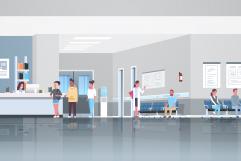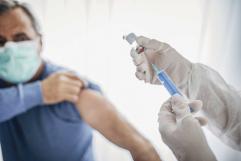
Ethics for healthcare in the 21st century
The pandemic has shown the system’s weaknesses that must be analysed from an ethical point of view in order to up-date notions such as equality, solidarity and allegiance regarding certain techniques.
At top speed, with virtually no information and using drugs that have been shown to be ineffective such as Remdesivir. This was what the first wave caused by Covid-19 was like for healthcare personnel. A year later and in the midst of the third wave, there are three vaccines approved and there are known protocols to follow, as well as the basic treatment for the disease. But the ICUs are still full and the healthcare workers are exhausted. The pandemic has challenged the ethics of the professionals and has generated questions that must be put on the table. These are some of the conclusions reached by the 13th International Seminar on Biomedicine, Ethics and Human Rights organised by ASISA, along with the Universidad Complutense de Madrid (UCM) and held on its premises, in which Doctor Fermando Bandrés a professor from the Faculty of Medicine from this university took part. Bandrés added another challenge: that of ‘technologisation’.
“The rules tell us what we must do and ethics, what we should do,” he explains. “And the pandemic has taught us that we have to resolve questions such as decision-making, recovery and up-dating the notion of equality or the concept of solidarity, as well as that of allegiance, when applying certain techniques.”
Weakness and threats
For the doctor, “the pandemic has allowed us to detect the weaknesses that considered in the healthcare system, because it has been shown that we have less skill and capacity than we think.” And for this reason, “a critical analysis must be carried out in terms of the system’s need and strengths, as well as the threats. Because healthcare is not going to be the same after the pandemic as it was before it,” he states.
For Bandrés, the problem lies in who will lead this change. “One of the characteristics of ethics to promote a scientific leadership, with scientific being understood as that which produces knowledge, shares it and stimulates others,” he states while he affirms that we have a scientific, technological and techno-scientific leadership crisis. “The pandemic has brought out both the best and the worst of us as a society and it is the time to unite ethics, legislation and politics in a thoughtful, considered way.” And “Ethics are very helpful when decisions have to be made regarding what healthcare must be like in the 21st century.”
The doctor recalls that in August 2020, the magazine The Lancet published an article by prestigious Spanish scientists and thinkers who talked about the need to put ideologies to one side and to analyse what happened from an ethical, scientific and political point of view, with honest criteria and no interests involved. “We must see the type of information we have given to citizens and how it was given; study what happened with the healthcare personnel, who are exhausted. Ethical conflicts have been considered in the decision-making in the ICUs, emergency rooms, in the drug assignments. And this takes its toll from the moral point of view.”
A long professional career
Fernando Bandrés is a University Professor in Biomedicine from the Universidad Europea and a Senior Lecturer for Legal Medicine and Toxicology at the Faculty of Medicine at the Universidad Complutense de Madrid (UCM). He directs the Extraordinary Complutense Professorship in Diagnosis and Innovation, Roche-UCM and the Advanced Studies Classroom at the Fundación Tejerina. He presides over the Scientific and Organising Committee of the International and Inter-university Seminar on Biomedicine and Human Rights that has been held on a yearly basis since 2004, with the participation of both public and private institutions and universities. Dr. Bandrés is also a member of Asisa’s Bioethics and Healthcare Rights Committee and he has been the Dean of the Faculty of Health Sciences at the Universidad Europea de Madrid.


